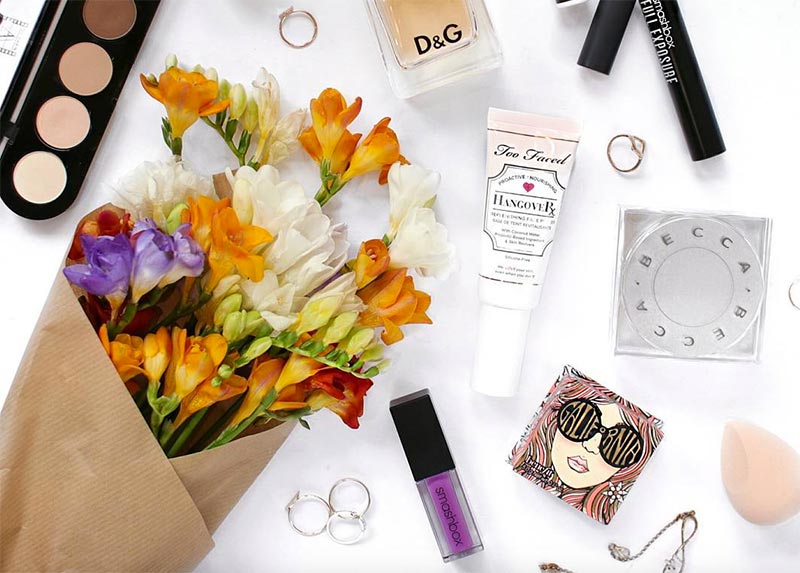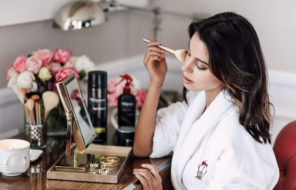To make the best of your makeup primer, you need to know how to choose one exactly for your skin type. The same face primer that your friend is obsessed with might not work for you, so make sure to follow our tips and choose the right makeup primer for your skin.
Makeup Primers for Normal Skin
If you have medium and small sized pores, and your skin doesn’t tend to get either dry or oily, doesn’t break out often, and does not become easily irritated, then you have a balanced, normal skin type. For those with normal skin, a makeup primer should simply create a smooth canvas and help foundation last longer. Almost all companies create this kind of primer for all skin types that may be crafted with or without silicone.
You might also want to experiment with makeup primers that have other properties – perhaps they are rich in antioxidants to keep your skin young and healthy, perhaps they will have a protective SPF and can substitute for sunscreen, or perhaps they will have an illuminating effect that will give your skin a dewy, strobed finish.
Makeup Primers for Dry Skin
Recognizing dry skin is pretty easy – it is marked by smaller pores, the occasional dry patches, and it rarely becomes greasy or shiny. Dry skin is much more prone to becoming dull, sallow, and irritated than other skin types.
Those with dry skin should definitely be using makeup primers with more emollient ingredients that will help reduce the look of dry patches and will also help moisturize the skin a little bit.
You want to avoid makeup primers with very mattifying ingredients like cyclopentasiloxane at the beginning of the ingredients list. Instead, look for reflective primers that will give your skin a dewy, diffused finish. Avoid primers with a ton of shimmer, though, since shimmer tends to emphasize the look of dryness.
Makeup Primers for Oily Skin
Oily skin tends to have larger pores (especially in the T-zone), and it very quickly becomes oily as the day wears on. Foundation tends to oxidize quicker when it sits on top of oily skin.
Those with oily skin are best off using silicone-based makeup primers, assuming they work well for their skin. Silicones – especially cyclopentasiloxane and dimethicone, have an ability to minimize the look of pores, and give the skin a matte finish. They also create a barrier between the oils the skin produces and the foundation, thereby preventing oxidization and helping the foundation last long.
Makeup Primers for Combination Skin
Those with combination skin have areas of their face that are drier, and others that are oilier. The division is most frequently an oily T-zone, and drier cheeks.
Those with combination skin can go in two routes: they can choose a simple, balanced makeup primer, or they can use two different types of makeup primers: a mattifying one for the oily areas of their face, and a more moisturizing one for the dry parts.
Makeup Primers for Acne-Prone Skin
Having acne doesn’t necessarily mean having oily skin. All skin types can suffer from breakouts, and a primer can definitely help.
A yellow or green tinted primer could help cover the redness caused by acne and keep foundation from fading away over it. Some makeup primers also include ingredients that help combat acne, like salicylic acid or benzoyl peroxide.
Makeup Primers for Mature Skin
A primer is an excellent choice for those whose skin is starting to show a bit of fine lines. It helps feel in any crevices into which foundation might settle. Makeup primers also diffuse imperfections, helping to make the skin seem more even.
The best choice would be a more hydrating primer, perhaps with some anti-aging ingredients. Much like when choosing a makeup primer for dry skin, it is best to avoid shimmer or sparkly primers, since they emphasize unevenness, including wrinkles.
Makeup Primers for Sensitive skin
Makeup primers are an excellent option for those with sensitive skin, because they provide a cushion to the skin from the onslaught of makeup. If your skin becomes easily red or irritated, you should opt for primers with simpler formulas, and shorter ingredient lists.
You can also choose makeup primers with skin-soothing ingredients like green tea extract or allantoin. Lastly, since sensitive skin can easily become red, a primer with a green or yellow tint can do a great job of providing color correction, thereby reducing the amount of foundation you have to wear.
Photo via @toofaced





